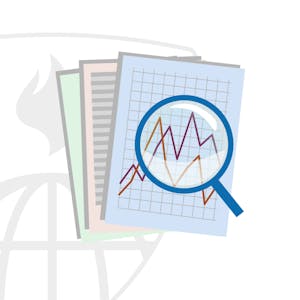Surveillance Systems Analysis, Dissemination, and Special Systems
In this course, we’ll build on the previous lessons in this specialization to focus on some very specific skills related to public health surveillance. We’ll learn how to get the most out of surveillance data analysis, focusing specifically on interpreting time trend data to detect temporal aberrations as well as person, place, and time in the context of surveillance data. We’ll also explore strategies for the presentation of surveillance data and some of the complex legal elements that affect its use. We’ll then turn our attention to surveillance of non-communicable chronic diseases and how the data can be used to support prevention efforts. Finally, we’ll explore special surveillance systems, such as syndromic surveillance, antimicrobial resistance, and event-related surveillance. This course is designed for public health practitioners with a focus on those working on health surveillance in municipal, regional, state, provincial, or even national public health agencies. We really think that this course will help those with an interest in health surveillance to see which approaches are used in actual practice of public health.
Analyze and interpret epidemiologic surveillance data
Present surveillance data in compliance with legal reporting requirements
Apply epidmiologic surveillance principles to non-communicable chronic diseases
Differentiate among indicator-based, event-based, and event-related surveillance systems
Syllabus
Syllabus - What you will learn from this course
Week 1
Analyses of Surveillance Data
Week 2
Dissemination Strategies and Communication Frameworks
Week 3
Chronic Disease Surveillance Systems
Week 4
Special Surveillance Systems
FAQ
When will I have access to the lectures and assignments?
Access to lectures and assignments depends on your type of enrollment. If you take a course in audit mode, you will be able to see most course materials for free. To access graded assignments and to earn a Certificate, you will need to purchase the Certificate experience, during or after your audit. If you don't see the audit option:
The course may not offer an audit option. You can try a Free Trial instead, or apply for Financial Aid.
The course may offer 'Full Course, No Certificate' instead. This option lets you see all course materials, submit required assessments, and get a final grade. This also means that you will not be able to purchase a Certificate experience.
What will I get if I subscribe to this Specialization?
When you enroll in the course, you get access to all of the courses in the Specialization, and you earn a certificate when you complete the work. Your electronic Certificate will be added to your Accomplishments page - from there, you can print your Certificate or add it to your LinkedIn profile. If you only want to read and view the course content, you can audit the course for free.
Is financial aid available?
Yes. In select learning programs, you can apply for financial aid or a scholarship if you can’t afford the enrollment fee. If fin aid or scholarship is available for your learning program selection, you’ll find a link to apply on the description page.
Reviews
Concise Lecture, with relevant information. Special thanks to the Course Instructor, JHSPH, and, Coursera.
This course is well structured with relevant examples and educative practice sessions. I've got what I seek for.
My gratitude to the instructor.
Great course! There were excellent cases of using different types of surveillance systems.
The concepts were discussed in a clear manner. Ijust realized how extensive is the scope of espidemiology. Much appreciation !
